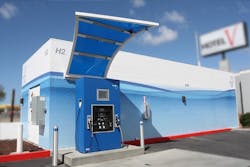Japan Carmakers to Build More Hydrogen Stations
A consortium of Japanese auto giants on Dec. 12 announced plans to set up a new company next year to build more hydrogen refueling stations, in an effort to bring fuel-cell cars into the mainstream.
There are currently 2,200 fuel-cell cars in Japan with 91 hydrogen stations, according to the industry ministry, but a lack of stations has been a major hurdle for carmakers as they seek to boost production.
A total of 11 firms, including Toyota -- the manufacturer of the Mirai, the world's first mass-market hydrogen fuel-cell car -- Nissan, Honda and the Japan unit of French industrial gases company Air Liquide have agreed to form the company.
The new firm wants to build 80 stations in the first four years of operation, the companies.
Fuel-cells work by combining hydrogen and oxygen in an electrochemical reaction, which produces electricity. This can then be used to power vehicles or home generators.
Toyota launched the Mirai -- which means "future" in Japanese -- in late 2014 as it looked to push further into the fast-growing market for environmentally friendly cars.
The Mirai was its first mass-market hydrogen fuel-cell car, after Toyota scored a win with the top-selling Prius hybrid, which combines a regular engine and rechargeable electric battery.
A Mirai fuel-cell vehicle costs 6.7 million yen (US$59,000), nearly double a comparable electric car.
But it does not emit CO2, has a longer cruising range and takes only a few minutes to refuel, compared with several hours required for an electric rival.
Last year, Nissan said it was developing fuel-cell technology that can power cars using plant-based ethanol, a first for the auto industry, and hopes to launch the system in time for Tokyo's 2020 Olympics.
Nissan said the system would be cheaper than rival offerings because it avoids the huge cost of setting up filling stations and would not require bulky hydrogen tanks to be stored on board.
Under a 2016 plan, the Japanese government and the auto industry aim to introduce 160 stations and 40,000 fuel-cell vehicles by March 2021.
By March 2018, there will be nine more stations
About the Author
Agence France-Presse
Copyright Agence France-Presse, 2002-2025. AFP text, photos, graphics and logos shall not be reproduced, published, broadcast, rewritten for broadcast or publication or redistributed directly or indirectly in any medium. AFP shall not be held liable for any delays, inaccuracies, errors or omissions in any AFP content, or for any actions taken in consequence.
